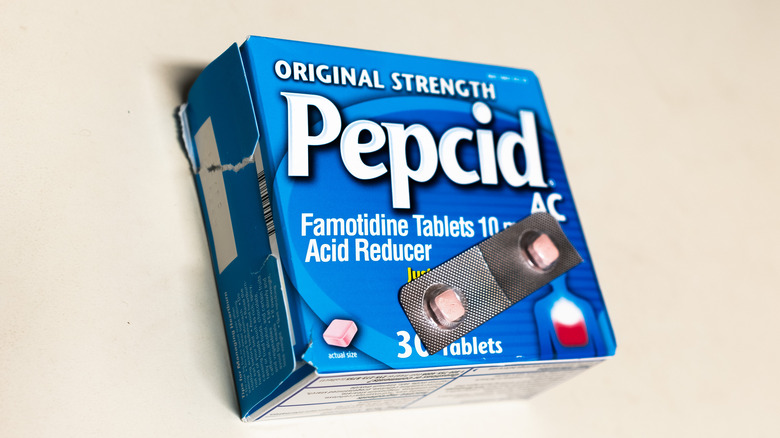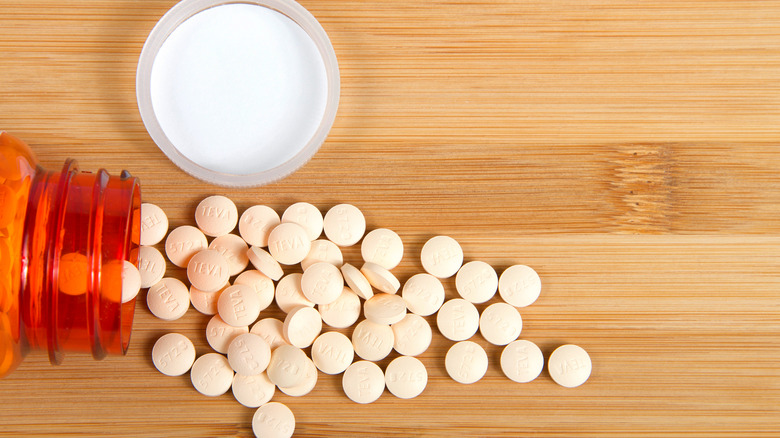This Is How Long It Takes For Pepcid To Start Working
According to the Cleveland Clinic, the digestive system is responsible for processing food and includes the liver, gallbladder, pancreas, and gastrointestinal (GI) tract. The GI tract contains many organs, including the stomach, mouth, esophagus, and small and large intestines, per the Cleveland Clinic. Although the stomach makes its acid to break down food and facilitate digestion, if the acid levels go beyond normal, it can lead to gastric ulcers, acid reflux, and gastroesophageal reflux disease (GERD), per Healthline. This is where acid reflux medications like Pepcid come in.
If you're planning to take Pepcid, you might wonder how long it takes to start working. Pepcid, also known as famotidine, is a common over-the-counter drug that helps with heartburn and acid indigestion (via MedlinePlus). A 2022 study published in the journal StatPearls describes famotidine as a competitive histamine H-receptor antagonist (H2RA), approved by the U.S. Food and Drug Administration (FDA). It inhibits gastric secretion and suppresses acid concentration in the stomach.
How long does it take for Pepcid to start working?
Pepcid's gastric acid-suppressing effects can kick in within 1 to 3 hours after taking the drug, according to Drugs.com. However, it may take up to 24 hours to work in people with GERD symptoms, and peak efficiency depends on how you take the drug. For this reason, it's always best to follow your doctor's prescription.
MedlinePlus outlines some best practices and precautions first-time Pepcid users should know. They include shaking liquified Pepcid for about 5 to 10 seconds before each use and mixing the medicine evenly. Those who prefer capsules can swallow the medication whole or properly chew the chewable tablets before swallowing them with a full glass of water. According to WebMD, you can also take Pepcid with or without food. Taking it before eating or drinking (especially fizzy beverages) is the best way to prevent heartburn or indigestion, per WebMD.
Regarding doses, MedicalNewsToday notes that doctors prescribe famotidine or Pepcid in low doses until your body adjusts to it. Other factors that can determine the right Pepcid dose include your medical history, the severity of your condition, and the form of famotidine, be it liquid, tablet, capsule, or intravenous route.
Common side effects of Pepid
According to Healthline, taking histamine 2 receptors like famotidine for the first time may present mild side effects like constipation, diarrhea, and dizziness, which usually subside over time. Drugs.com links Pepcid to common side effects like headaches, dizziness, constipation, or diarrhea. These side effects may not require medical attention, but the source warns of other more serious side effects that do. They include unusual bleeding, insomnia, breathing difficulties, bloody urine or stool, and other skin-related disorders.
The Harvard Medical School reveals that many acid reflux medications, including famotidine, might cause depression as a side effect. For this reason, it's more than crucial to consult your doctor when you experience any form of hallucination, unexplained drowsiness, or anxiety after taking famotidine. WebMD also lists famotidine among various medicines that can potentially cause erectile dysfunction in men. The American Association of Retired Persons reiterates that H2 histamine blockers like famotidine can cause impotence when users take high doses over a long period of time.



